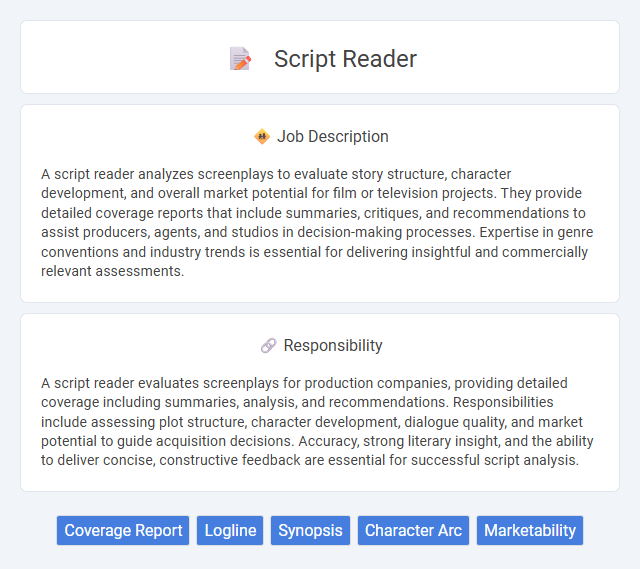
A script reader analyzes screenplays to evaluate story structure, character development, and overall market potential for film or television projects. They provide detailed coverage reports that include summaries, critiques, and recommendations to assist producers, agents, and studios in decision-making processes. Expertise in genre conventions and industry trends is essential for delivering insightful and commercially relevant assessments.
Individuals with strong attention to detail and a passion for storytelling are likely to thrive as script readers, as the role requires careful analysis of narrative structure and character development. People who enjoy critical thinking and can maintain objective judgment might find this job well-suited to their skills. However, those who struggle with prolonged focus or find repetitive reading tasks tedious may not be as compatible with the demands of this position.
Qualification
Script reader jobs require strong analytical skills and a deep understanding of storytelling elements such as plot, character development, and pacing. Candidates should possess excellent written and verbal communication abilities to provide clear, concise feedback and reports. Experience in literature, film studies, or screenwriting enhances the ability to evaluate scripts effectively and identify market potential.
Responsibility
A script reader evaluates screenplays for production companies, providing detailed coverage including summaries, analysis, and recommendations. Responsibilities include assessing plot structure, character development, dialogue quality, and market potential to guide acquisition decisions. Accuracy, strong literary insight, and the ability to deliver concise, constructive feedback are essential for successful script analysis.
Benefit
Script reader jobs probably offer valuable exposure to the entertainment industry, allowing individuals to develop strong analytical skills by evaluating diverse scripts. This role might provide networking opportunities with writers, producers, and agents, potentially opening doors for future career growth. It can also enhance one's understanding of storytelling techniques, increasing the likelihood of success in related creative fields.
Challenge
Script readers often face the challenge of quickly analyzing large volumes of scripts to identify potential hits or marketable stories, which requires not only sharp analytical skills but also an understanding of current industry trends. The pressure to provide concise, insightful coverage under tight deadlines may increase the likelihood of oversight or bias. Navigating subjective tastes while maintaining objective evaluations can further complicate the decision-making process for script readers.
Career Advancement
A script reader plays a crucial role in the entertainment industry by evaluating screenplays and providing detailed coverage to producers and studios, which can lead to opportunities for career advancement in development or production roles. Mastery of storytelling elements and industry trends enhances a script reader's value, often paving the way to positions such as story editor, development executive, or literary agent. Building a strong network within the industry accelerates progression, expanding access to higher-level projects and decision-making responsibilities.
Key Terms
Coverage Report
A Script Reader evaluates screenplays and provides a detailed Coverage Report that summarizes the plot, character development, and marketability of the script. This report highlights strengths, weaknesses, and potential improvements, assisting producers and agents in decision-making processes. Expertise in storytelling elements and industry trends is essential for producing insightful and concise script coverage.
Logline
A script reader specializes in evaluating screenplays by analyzing their loglines to determine storyline clarity and market potential. The logline serves as a concise summary that captures the essence and central conflict of the script, crucial for quick decision-making by producers and agents. Effective logline assessment enhances the script reader's ability to filter submissions, ensuring only compelling, commercially viable projects advance.
Synopsis
A Script Reader evaluates screenplays and provides detailed synopses that summarize key plot points, character arcs, and thematic elements. Their synopses help producers and directors quickly assess the story's potential and suitability for production. Accurate and concise script summaries are essential for efficient decision-making in the film and television industry.
Character Arc
Script readers carefully analyze character arcs to evaluate narrative coherence and emotional depth in screenplays. They assess how characters develop through key turning points and whether their transformations are believable and impactful. Detailed feedback on character progression helps writers refine story structure and enhance audience engagement.
Marketability
Script readers enhance their marketability by developing strong analytical skills and an in-depth understanding of various film genres and narrative structures. Proficiency in providing detailed coverage reports and acquiring knowledge of industry trends increases their value to production companies and studios. Building a network within the entertainment industry further improves job prospects and potential career advancement opportunities.
 kuljobs.com
kuljobs.com